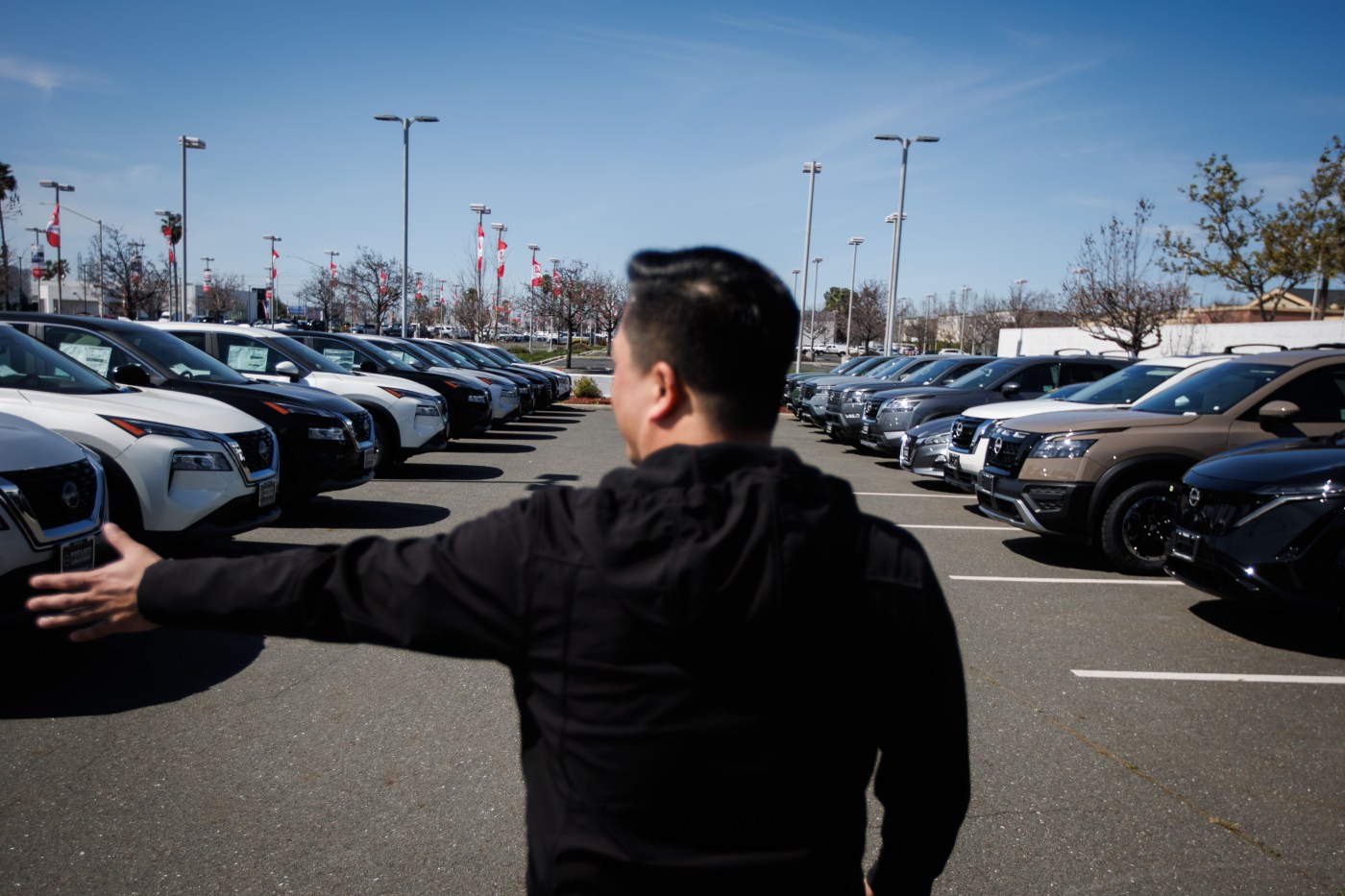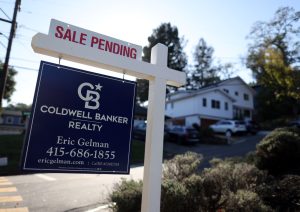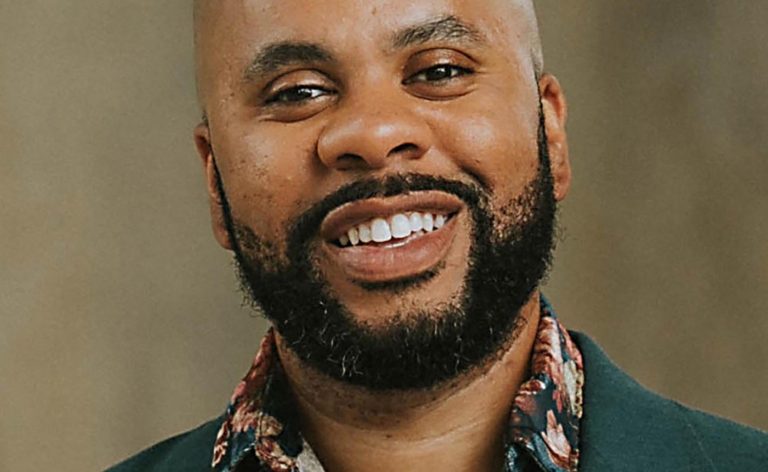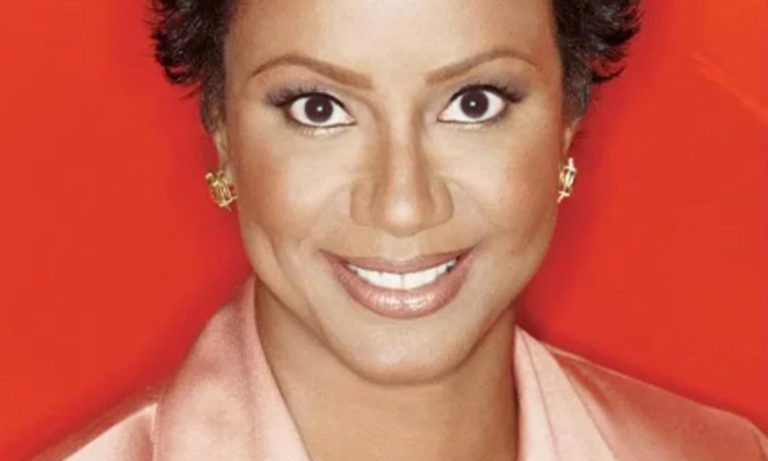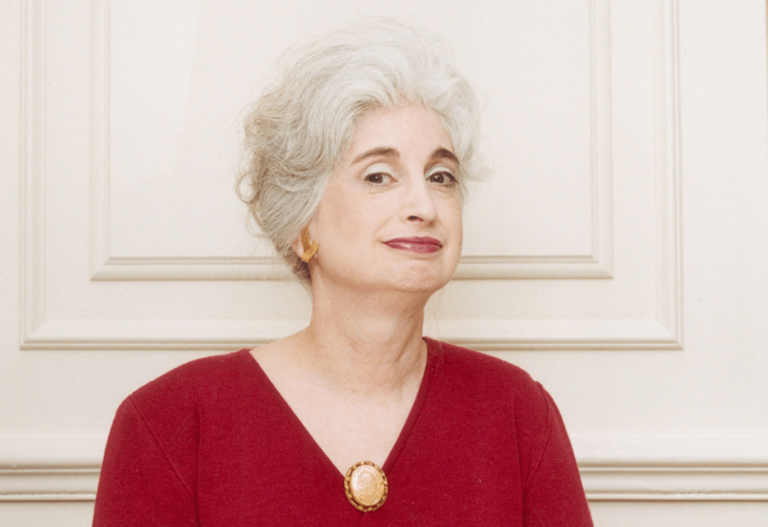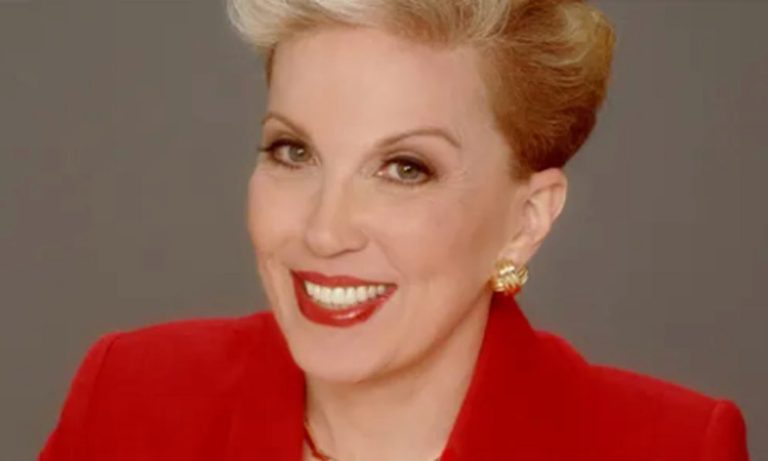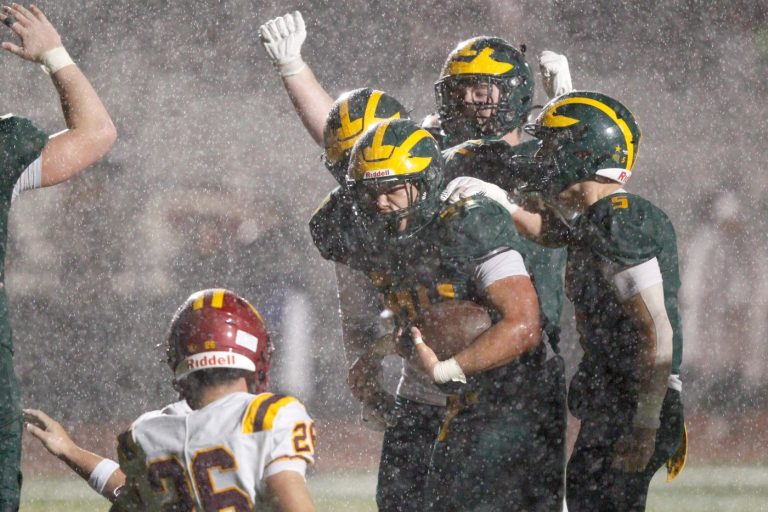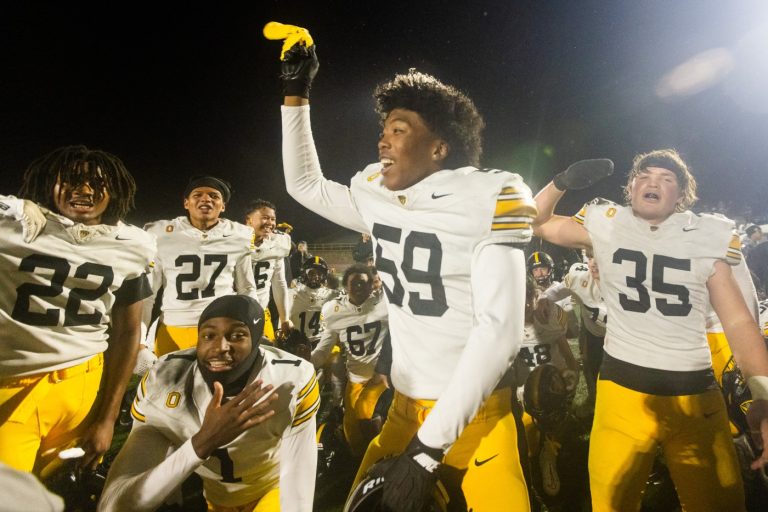It looks like a car-pocalypse! Hondas, Fords, Toyotas, Dodges, Hyundais, BMWs and Chevys sit in colorful rows, filling Bay Area car dealership lots — with nary a human in sight.
“We’ve got cars but nobody’s buying,” said Alan Le, sales manager at Premier Nissan of Fremont, where six rows of Rogues, Ariyas and other models line a parking lot that only two years ago, thanks to COVID disruptions, had just a single row of vehicles. “In the pandemic, people were fighting to buy cars.”
At some dealerships, salespeople loiter hopefully outside, watching for signs of life amid a sea of parked cars and trucks. At other car lots, sales staff linger gloomily at desks.
Rafael Diaz, general sales manager, speaks to The Mercury News at Sunnyvale Chrysler Dodge Jeep Ram in Sunnyvale, Calif., on Thursday, March 21, 2024. (Nhat V. Meyer/Bay Area News Group)
“Everybody’s waiting to see what the banks are going to do as far as interest rates,” said Rafael Diaz, general sales manager at Sunnyvale Chrysler Dodge Jeep Ram.
In terms of prices alone, now is the best time to buy a new or used car since the pandemic, experts say. The COVID era’s supply chain disruptions, stimulus payments, bargain-basement interest rates and fear of public transportation conspired to tank inventory, drive costs through the roof and slam the brakes on dealer incentives starting in early 2021.
The “wild ride” and painful lesson in supply and demand appears over, said Ivan Drury, an analyst at Edmunds, which tracks the auto industry. Prices have fallen from record highs into a downward slide. And for buyers, the picture is expected to keep getting brighter.
Alan Le, a sales manager at Premier Nissan of Fremont, talks about the current car market on Thursday, March 21, 2024, in Fremont, Calif. (Dai Sugano/Bay Area News Group)
Related Articles
Proposal would change how California power bills are calculated, aiming to relieve summer spikes
Why do airlines charge so much for checked bags? This obscure rule helps explain why
Why Trader Joe’s raised banana prices for the first time in decades
Power up: PG&E says electricity plan can boost Silicon Valley innovation and economy
Why Costco’s hot dog is still $1.50 when everything has gotten so expensive
Two years ago, new-car buyers were paying thousands of dollars over manufacturers’ suggested retail price, Drury said. “Now, you can actually get a discount of thousands of dollars,” he said. “The tides have definitely turned.”
In the Bay Area in February 2023, cars took 29 days to sell, on average, Drury said. This February, they sat for 48 days. The longer vehicles remain unsold, the better the deals, Drury said. “That’s where we start to see the incentives flow,” Drury said.
There might be a healthy supply, but we’re still not back down to earth on car prices from record pandemic highs.
Thanks to inflation boosting the cost of making and shipping new cars, new-vehicle prices as of February were 14% higher than in February 2021, just before the COVID price surge hit, according to Brian Moody, senior editor at auto-research firm Kelley Blue Book.
New car prices in California skyrocketed from $42,593 in 2021 to a record-high $47,318 in 2022, but last year had fallen to $46,826, Moody said.
The price slide is likely to continue, experts and salespeople said. And the Federal Reserve has signaled that it may cut interest rates later this year.
A Dodge Challenger for sale at Sunnyvale Chrysler Dodge Jeep Ram in Sunnyvale, Calif., on Thursday, March 21, 2024. (Nhat V. Meyer/Bay Area News Group)
Still, Bay Area residents not able to wait for better deals will find discounts on sticker prices and interest rates — but they vary widely by manufacturer, model and year.
“There are so many strange things happening in the automotive market,” Drury said. “When it comes down to the individual consumer, homework is king.”
One model of a manufacturer’s cars may not have a discounted or negotiable price, and another model may be “an amazing deal,” Moody said. Incentives offered by manufacturers through their financing partners mean interest rates can also vary widely.
At some Bay Area dealerships, painted messages on windshields tout price discounts and interest-rate specials, but generally only for the makes, years and models in less demand.
Mid-sized SUVs are sought after. Minivans are, if not cool, at least popular — Chrysler’s Pacifica hybrid is popular among tech workers with families, said sales manager Diaz.
Jesus Silva, a sales associate at AutoNation Honda Fremont, talks about the current car market on Thursday, March 21, 2024, in Fremont, Calif. (Dai Sugano/Bay Area News Group)
Many hybrids sell quickly. “People are so into hybrids right now,” said AutoNation Honda Fremont salesman Jesus Silva. Drivers for DoorDash and other gig-work firms buy them to save money on fuel, and middle-aged consumers wary of electric vehicles find them a good “stepping stone,” Silva said.
Sales of new electric vehicles are slumping nationwide over charging and range worries, and in the Bay Area, many who would buy them already have, experts say. Prices for EVs in the U.S. are down 13% compared to last year, with the leading models, Tesla’s Model 3 and Model Y, cheaper than they’ve ever been, research firm Cox Automotive reported in early March.
Pricing by manufacturer between early last year and early this year fluctuated wildly, Cox Automotive data show. Nissan’s average price plunged 9%. Buick’s went down 5%, Ford’s fell 4% and Honda’s sank a little less than 2%. Tesla’s price plummeted 16%. But Chrysler’s and Jeep’s prices jumped 7% and Ram’s shot up 13%. Prices for Kia, Lexus, Hyundai and Mazda increased by around 4%. Toyota’s went up a little over 2% and Volkswagen’s rose less than 1%.
Many models from Toyota and Honda remain at a premium because of high demand, Drury said. Shoppers visiting AutoNation Honda Fremont may find ideals on Passports — large SUVs — and Ridgeline pickup trucks, but on most other models there is little or no room for negotiation, salesman Silva said.
Related Articles
Proposal would change how California power bills are calculated, aiming to relieve summer spikes
Why do airlines charge so much for checked bags? This obscure rule helps explain why
Why Trader Joe’s raised banana prices for the first time in decades
Power up: PG&E says electricity plan can boost Silicon Valley innovation and economy
Why Costco’s hot dog is still $1.50 when everything has gotten so expensive
For used vehicles, buyers are also seeing prices more enticing than in the recent past, thanks to a relatively plentiful supply — more than 2 million sat on dealers’ lots in early February, Moody said. California used car prices peaked in spring of 2022, took a dive in April 2023, bumped up again then slid. “We’re down at the lowest point in at least two years,” Moody said.
However, average prices in California for used cars at dealerships are still higher than before the pandemic disruptions, at $30,788 in 2023 compared to $27,718 in 2021. But they’re lower than 2022’s $31,063. Older used cars are still going for “a remarkable amount of money,” Drury said, noting that U.S-wide, the average price of a 9-year-old car is $16,000 — much higher than the pre-pandemic average of $9,000 to $10,000, Drury said. “The cheaper the car is the faster it sells because people are going for value,” Drury said.
The best deals are likely to be found on used cars 1 to 3 years old, Drury said, because falling new car prices are “pushing down the price of those near-new vehicles.”
Anyone planning to finance a used car may find interest rates that often top 10% to be a strong deterrent.
Julie Rice, right, from San Francisco, talks to The Mercury News about looking for a used Toyota RAV4 for her daughter Jessica, left, at Toyota Sunnyvale in Sunnyvale, Calif., on Thursday, March 21, 2024. (Nhat V. Meyer/Bay Area News Group)
“I feel like there’s a little bit of an inflection point — you don’t want anything that’s too, too old,” said Julie Rice, who was at Toyota Sunnyvale recently shopping for her daughter, Jessica, a 20-year-old Cal Poly student. Toyota’s RAV4 compact SUV seemed like a good bet.
Looking at prices of newer used cars “starts to cross into the territory of, ‘Why don’t we get a new car?’” said Rice, of San Francisco. She and her husband wanted to finance the car in their daughter’s name, and co-sign the loan, to build up her credit score. But with interest rates so high, Rice said she would make sure the loan carried no penalty for paying it off quickly.
Diaz at Sunnyvale Chrysler Dodge Jeep Ram expects new-vehicle incentives to sweeten as long as interest rates are quashing demand. “The manufacturers will have to help out,” Diaz said. “They’re going to have to give dealers more rebates to move these vehicles.”
